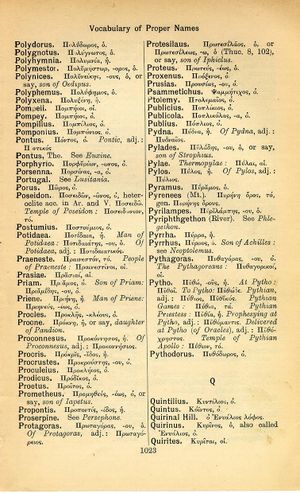Polyxena: Difference between revisions
From LSJ
ἀσκεῖν περὶ τὰ νοσήματα δύο, ὠφελεῖν ἢ μὴ βλάπτειν → strive, with regard to diseases, for two things — to do good, or to do no harm | as to diseases, make a habit of two things — to help, or at least, to do no harm
(Names) |
(6_12) |
||
| Line 1: | Line 1: | ||
{{WoodhouseENELnames | {{WoodhouseENELnames | ||
|Text=[[File:woodhouse_1023.jpg|thumb|link={{filepath:woodhouse_1023.jpg}}]]Πολυξένη, ἡ. | |Text=[[File:woodhouse_1023.jpg|thumb|link={{filepath:woodhouse_1023.jpg}}]]Πολυξένη, ἡ. | ||
}} | |||
{{Lewis | |||
|lshtext=<b>Pŏlyxĕna</b>: ae, f., = Πολυξένη,<br /><b>I</b> a [[daughter]] of [[Priam]], whom [[Pyrrhus]], the [[son]] of [[Achilles]], sacrificed at his [[father]]'s [[grave]], Ov. M. 13, 448; Juv. 10, 262; Sen. [[Troad]]. 368; Hyg. Fab. 110; cf. Verg. A. 3, 321.— Hence,<br /><b>II</b> Pŏlyxĕnĭus, a, um, adj., of [[Polyxena]], Polyxenian: [[caedes]], Cat. 64, 369. | |||
}} | }} | ||
Revision as of 08:22, 13 August 2017
English > Greek (Woodhouse)
Πολυξένη, ἡ.
Latin > English (Lewis & Short)
Pŏlyxĕna: ae, f., = Πολυξένη,
I a daughter of Priam, whom Pyrrhus, the son of Achilles, sacrificed at his father's grave, Ov. M. 13, 448; Juv. 10, 262; Sen. Troad. 368; Hyg. Fab. 110; cf. Verg. A. 3, 321.— Hence,
II Pŏlyxĕnĭus, a, um, adj., of Polyxena, Polyxenian: caedes, Cat. 64, 369.

